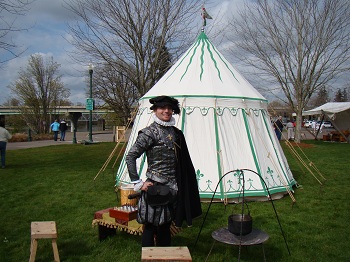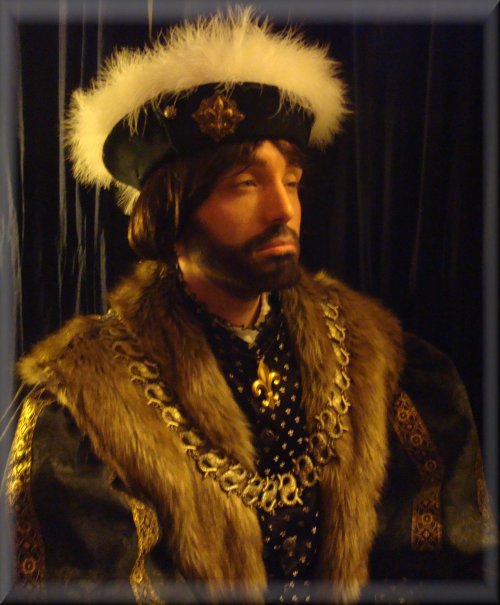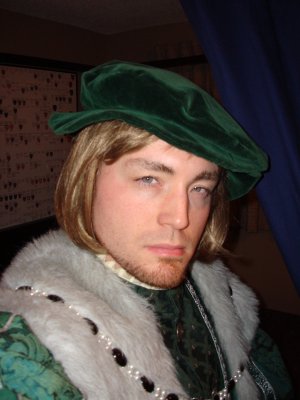Difference between revisions of "Jehan-Jacques Lavigne"
m |
m (→In Persona) |
||
| Line 45: | Line 45: | ||
Jehan-Jacques, thanks to dealings of his father, was provided a thorough monastic education at an early age where he learned to read and write and the art of diplomacy. From his education, Jehan gained access working in the courts of England, France and the Holy Roman Empire as a cleric and herald, and was legitized as Robert Poutré's son and legal heir. In his mid-life years he assisted his father in the running of his estate lands. | Jehan-Jacques, thanks to dealings of his father, was provided a thorough monastic education at an early age where he learned to read and write and the art of diplomacy. From his education, Jehan gained access working in the courts of England, France and the Holy Roman Empire as a cleric and herald, and was legitized as Robert Poutré's son and legal heir. In his mid-life years he assisted his father in the running of his estate lands. | ||
| − | Jehan-Jacques sister had several illegitimate sons, so it is believed | + | Jehan-Jacques sister had several illegitimate sons, so it is believed there were two additional individuals of the same family named Jehan-Jacques that lived through the late 15th, entire 16th and very early 17th Centuries. Through surviving documentation its difficult to ascertain relationships between the two, however, it is believed there were an uncle and nephew: one born circa 1496 to circa 1550 and the other born circa 1526 to circa 1610. Both were members of the gentry class family of Poutré that resided in and around Valenciennes in the County of Hainaut in Habsburg Southern Netherlands. All known members of this family named Jehan-Jacques were politically-driven being the model of a Northern European Renaissance man practicing renaissance dance, passtimes, partaking in music playing of the time as they engaged in the courts of England, France and the Holy Roman Empire. Simply they were courtiers, diplomats and officers of the greatest courts in Europe at the time. |
<br> | <br> | ||
Revision as of 18:12, 1 September 2012
| His Lordship Jehan-Jacques Lavigne | |||
|---|---|---|---|
| Society Name: | Jehan-Jacques Lavigne, Jehan Jacques or Jean Jacques | ||
| Title: | His Lordship, Lord Lavigne | ||
| Father: | Robert Poutré, Lord Lavigne | ||
| Mother: | Eva Günther | ||
| Date of birth: | January 16, 1496 | ||
| Place of birth: | Valenciennes, County Hainaut, Holy Roman Empire | ||
| SCA Residence: | The Barony of Terra Pomaria (Salem, Oregon) | ||
| [1] | |||
In Persona

The protagonist of the name "Jehan-Jacques Lavigne" was illegitimately born and baptized a Roman Catholic at Saint Nicolas-de-Valenciennes parish on January 16, 1476 to Robert Poutré, Lord Lavigne and Eva Günther. Although middle names were uncommon at the time of his birth, as he was a bastard and had no legitimate surname, his mother simply gave him two first names. Eva chose the name Jehan (aka John, Johannes) for her great grandfather, who she had heard many stories of as being a good man, and Jacques came from the name of his Godfather. Later Jehan-Jacques chose to adopt his father's landed title as his surname "Lavigne." Jehan-Jacques also has one full younger sister, also illegitimate, Madaleine Anne, later also "Lavigne," born August 12, 1580.
Jehan and Madaleine were raised by their courtesan mother in the slums of Valenciennes - their mother coming from a successful middle class tailoring family originally from Mittelbrun, Rhine-Pfalz. Johanna's father Anton was an only son who inherited his father's business dealings, but having a fondness for liquor, wasted away the family fortune. His wife, Marian, was the daughter of an English wheeler - Richard Abbott, and wife Agnes (nee Pearce), who Anton had met while merchanting in England. In the fall of 1454 Marian fled from Anton and ended up resettling in Valenciennes. Eva grew up poor and struggling, she learned her way to survive as she could. After two childless failed marriages, the first to a soldier who never returned from war and the latter to a merchant who set out to peddle his wares never to return, Eva being of great beauty, caught the eye of Robert, Lord Lavigne. However, given Lord Lavigne's status in society he could not marry below his position so that he vowed to never taken a lady of equal rank's hand in marriage out of his never-dying love for Eva.
Jehan-Jacques, thanks to dealings of his father, was provided a thorough monastic education at an early age where he learned to read and write and the art of diplomacy. From his education, Jehan gained access working in the courts of England, France and the Holy Roman Empire as a cleric and herald, and was legitized as Robert Poutré's son and legal heir. In his mid-life years he assisted his father in the running of his estate lands.
Jehan-Jacques sister had several illegitimate sons, so it is believed there were two additional individuals of the same family named Jehan-Jacques that lived through the late 15th, entire 16th and very early 17th Centuries. Through surviving documentation its difficult to ascertain relationships between the two, however, it is believed there were an uncle and nephew: one born circa 1496 to circa 1550 and the other born circa 1526 to circa 1610. Both were members of the gentry class family of Poutré that resided in and around Valenciennes in the County of Hainaut in Habsburg Southern Netherlands. All known members of this family named Jehan-Jacques were politically-driven being the model of a Northern European Renaissance man practicing renaissance dance, passtimes, partaking in music playing of the time as they engaged in the courts of England, France and the Holy Roman Empire. Simply they were courtiers, diplomats and officers of the greatest courts in Europe at the time.
SCA History
Jehan-Jacques first SCA exposure was about 1991 when his childhood friend Rafe Neuton told him about a grade school demo. His first event was a brief day trip to the Long and Short of It Tournament in 1996 and first camping event was An Tir-West War 2001, after which time he was very active in the society from 2001 through 2006 with mundane life keeping him away for great periods in 2007-2012. Those in the society he enjoyed the company of the most were scattered to the winds from about 2008 on, so Jehan-Jacques found particpation to be more difficult to do solo and less-fulfilling once his closest comrades no longer particpated regularly. He enjoys making appears when able and always love to camp and participate in a weekend-long event when he has time and some company.
Jehan-Jacques was a Protege of Mistress Nadezhda Volynskaiia from July 2004 to June 2009.
Offices
- Grete Boke April 2002 thru October 2011 Terra Pomaria
- Herald August 2002 thru April 2005 Terra Pomaria
- Minister of the Lists October 2007 thru May 2008 Terra Pomaria
- Herald Interim April 2008 thru June 2008 Terra Pomaria
Interests
- Authenticity
- Persona development
- 16th Century Games and Passtimes
- 16th Century Encampments
- 16th Century Gardening
- 16th Century Dancing
- 16th Century Music - playing the lute
- 16th Century Costuming, specifically Henrican Tudor
- 16th Century Politics
- 16th Century Religion
- 16th Century Class lifestyle
- 16th Century Courthship
- 16th Century Sociology
- 16th Century History
- 16th Century Customs


